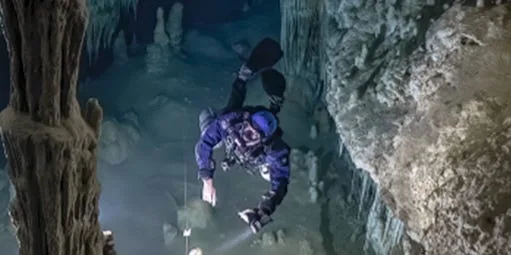Exploring the Microbial Communities in Mexico’s Underwater Caves
The Underwater Wonders of Mexico’s Yucatán Peninsula
The Sac Actun cave system on Mexico’s Yucatán Peninsula contains many wonders, from a 13,000-year-old skeleton to human artifacts and fossils of giant sloths. But perhaps the most important aspect of these underwater caves is their role as an important drinking water resource for the region. The Yucatán Peninsula Aquifer, which includes the cave system and its cenotes, or sinkholes, provides drinking water for millions of people in the area.
Mapping Microbial Communities in the Aquifer
To better understand the underwater cave system and ensure the health of the aquifer, researchers from Northwestern University embarked on a mission to map the unique communities of microbes that inhabit its waters. They collected samples from a dozen sites within the cave system, including caves flooded with coastal seawater and deep cenotes exposed to the surface.
The team discovered that different environments within the underwater cave system hosted different types of organisms, but these organisms were all performing similar ecological functions. For example, the authors of the study identified a particular bacteria called Comamonadaceae that showed up in multiple locations, playing different roles and interacting with various microbes. This bacteria may be considered a “keystone species” that plays a fundamental role in maintaining the health of the ecosystem.
Safeguarding the Aquifer from Contamination
Preserving the integrity of the aquifer and the cave system is crucial for ensuring a clean and abundant drinking water supply for the population. However, there are concerns about potential contamination from human activities. For instance, the planned train system from Cancún to the Yucatán Peninsula could pose a risk of diesel leakage into the cenotes, threatening the water quality.
Furthermore, the introduction of organic matter, such as human waste, can have a significant impact on the microbial communities in the aquifer. When organic matter is oxidized in the water, it can lead to pollution and the presence of harmful compounds, including ammonia and sulfide derivatives. Additionally, chemicals from medications and personal care products have already been detected in the aquifer.
The Importance of Sustainable Practices
The research conducted by Northwestern University provides valuable insights into the delicate balance within the Yucatán Peninsula Aquifer and highlights the need for sustainable practices and regulations to safeguard this critical water source. As the region experiences increasing tourism and human activity, it becomes even more crucial to prioritize the protection of these fragile ecosystems.







